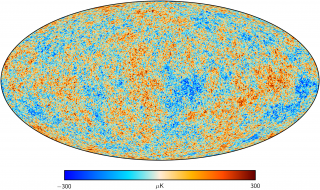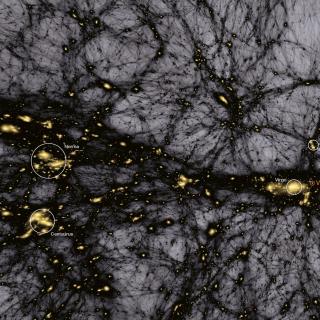Bibcode
Luzzi, G.; Génova-Santos, R. T.; Martins, C. J. A. P.; De Petris, M.; Lamagna, L.
Bibliographical reference
Journal of Cosmology and Astroparticle Physics, Issue 09, article id. 011, pp. (2015).
Advertised on:
9
2015
Citations
39
Refereed citations
34
Description
The CMB temperature-redshift relation,
TCMB(z)=T0(1+z), is a key prediction of the
standard cosmology but is violated in many non-standard models.
Constraining possible deviations from this law is an effective way to
test the ΛCDM paradigm and to search for hints of new physics. We
have determined TCMB(z), with a precision up to 3%, for a
subsample (103 clusters) of the Planck SZ cluster catalog, at redshifts
in the range 0.01–0.94, using measurements of the spectrum of the
Sunyaev-Zel'dovich (SZ) effect obtained from Planck temperature maps at
frequencies from 70 to 353 GHz. The method adopted to provide individual
determinations of TCMB(z) at cluster redshift relies on the
use of SZ intensity change, Δ ISZ(ν) at different
frequencies and on a Monte Carlo Markov chain approach. By applying this
method to the sample of 103 clusters, we limit possible deviations of
the form TCMB(z)=T0(1+z)1‑β
to be β= 0.012 ± 0.016, at 1σ uncertainty, consistent
with the prediction of the standard model. Combining these measurements
with previously published results, we get β=0.013±0.011.
Related projects

Anisotropy of the Cosmic Microwave Background
The general goal of this project is to determine and characterize the spatial and spectral variations in the temperature and polarisation of the Cosmic Microwave Background in angular scales from several arcminutes to several degrees. The primordial matter density fluctuations which originated the structure in the matter distribution of the present
Rafael
Rebolo López

Cosmology with Large Scale Structure Probes
The Cosmic Microwave Background (CMB) contains the statistical information about the early seeds of the structure formation in our Universe. Its natural counterpart in the local universe is the distribution of galaxies that arises as a result of gravitational growth of those primordial and small density fluctuations. The characterization of the
FRANCISCO SHU
KITAURA JOYANES